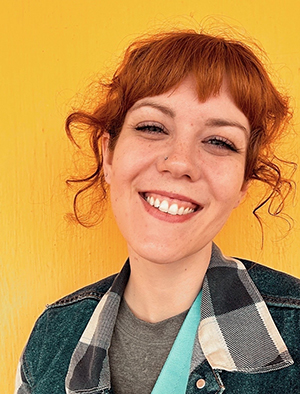Disentangling the narratives: Purdue public health researcher evaluates nuances in abortion attitudes
Written By: Rebecca Hoffa, rhoffa@purdue.edu

From changes in legislation to political debates, abortion and reproductive rights have been a central issue explored in the media in recent years. The issue is often discussed in two camps: those who support abortion rights, who are often labeled as “pro-choice” in many political contexts, and those who are against abortion, who are often labeled as “pro-life.”
In a recent study titled “Can Someone Be Both Pro-Life and Pro-Choice? Results from a National Survey of U.S. Adults,” Kathryn LaRoche, assistant professor in Purdue University’s Department of Public Health, has found that people’s abortion identities are much more complicated than two simple labels.

Kathryn LaRoche(Photo provided)
“If you say someone is ‘pro-life,’ what does that mean?” LaRoche said. “Does that mean that they don’t want abortion in any circumstances, that they’re OK in some circumstances but not in others? There’s just so many ways that you can break this down. We assume a lot about people with those terms. When we gave people the option to identify as partially pro-life or partially pro-choice, 64% of people in this national survey identified as both. They felt a connection in some way to both of these labels.”
The study, which was conducted in collaboration with researchers at Indiana University Bloomington, was centered around a national survey that used two different formats for gathering abortion attitudes. It began with categorical responses that required participants to rank their feelings toward abortion on a sliding scale. Then, it asked participants to explain their responses through open-ended questions, which were analyzed for content and themes. Participants were also asked to provide their sociodemographic information.
“Really what comes out when you ask people about this is that how people feel about abortion is contextual,” LaRoche said. “People think abortion is OK in some circumstances and not in others, but nobody has the same circumstances in their mind.”
LaRoche has talked to hundreds of people about their abortion experiences in her work, and she noted their feelings are often mixed, with some people feeling tensions with their beliefs or conflicting emotions, even if they feel they made the right decision. The open-ended questions in the survey revealed more of the subtleties that shape people’s attitudes toward abortion, as participants often identified the challenges and complexities of an abortion decision.
“Even when people said that they thought abortion should be legal, no one used positive words to talk about abortion, and it was always framed very negatively,” LaRoche said. “It really felt like a serious and undesirable decision. So, people in this sample who expressed support for abortion were saying things like, ‘I think abortion is a difficult choice to make, and people need to be able to make that decision.’”
Ultimately, the study aims to redefine the ways in which people talk about and frame abortion when approaching it as a major political and health care issue. LaRoche, who grew up in Canada, said the way abortion is approached in Canada versus the United States is starkly different, and that has fueled her interest in helping to improve the discourse.
“There are people who are so strongly anti-abortion that they have moved away from circumstances in which many people who identify as pro-life feel comfortable with,” said LaRoche, looking at current attitudes in the U.S. “There is broad support among people who are both pro-life and pro-choice for people being able to have abortions in cases of rape, incest, life endangerment or severe fetal anomaly. … However, in Indiana for example, there was debate among legislators about whether people who became pregnant from sexual assault should be able to have a legal abortion in the state. This was presented as a ‘pro-life policy’ but is not a widely held belief among people who identify as pro-life. It’s important that we distinguish between those and that we have accurate labels and language that people can use when they talk about these issues.”
Beyond this publication, LaRoche approaches a wide range of reproductive health issues in her research, including evaluating pregnancy loss and miscarriage experiences to help fill resource needs; exploring resources that help younger people connect with reproductive health care; and, most recently, gathering data about pregnancy experiences for individuals who have sickle cell disease, a blood disorder that requires distinct health care treatments.
“We want to think of this through a broad lens,” LaRoche said. “Miscarriage and pregnancy loss is really related to abortion — they use the same kinds of medications and technologies. I see this overall in relation to reproductive justice. I’m very much interested in trying to think about how we can support people to have the right to have children, to not have children, and to raise those children in safe and sustainable communities. How can we make sure people feel empowered to make informed reproductive health decisions?”
For LaRoche, ultimately, she hopes to make a difference in approaches, resources and discourse surrounding reproductive health and abortion to help improve outcomes for individuals throughout the United States.
“When we talk about abortion and reproductive health, people tend to want to put things in a very black-or-white, dichotomous framework and talk about things as polarized and extreme, and as we see with people’s abortion attitudes but also people’s abortion experiences, neither of those extreme narratives are actually really serving people,” LaRoche said. “People may support abortion in certain circumstances, or people may really not like abortion but still believe it should be legal.
“It’s really disentangling these really polarized narratives because when you talk about complex issues in such small, unnuanced ways, it doesn’t help anybody to understand what the actual issue is.”
Discover more from News | College of Health and Human Sciences
Subscribe to get the latest posts sent to your email.